by California Casualty | Firefighters |
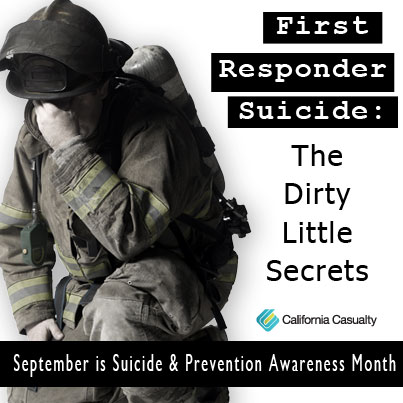
By Mark Goldberg, Communications Specialist with California Casualty
September is Suicide Prevention and Awareness Month. A lot of people don’t like talking about it, but it’s time more of us did.
The topic got a lot more personal for me this July when a good friend and retired firefighter, Tim Casey, took his life. Tim had written for the California Casualty blog about his life as a firefighter and the scars (both physical and mental) he carried from his 30 years as a first responder (read here).
I knew Tim had his struggles; he admitted that he was a recovering alcoholic, haunted by the things he saw on the job. He battled PTSD and the desire to drown those images in a bottle of booze. But it appeared things were looking up for Tim. He was engaged to a wonderful woman, was very involved in spreading awareness about first responder suicides and was teaching at one of the local universities. The last time I talked with Tim he seemed up-beat and happy; but I guess the demons were stronger than I or many others knew.
His funeral was moving, but it left me feeling sad and empty. I came away determined to do what I could to help carry on Tim’s mission to alert others about the growing epidemic of firefighter and first responder suicide. Unfortunately, I feel a lot like Sisyphus, struggling to push a giant rock up a hill. Here’s why:
- A new study from Florida State University found half of the 1,000 firefighters they surveyed said they had suicidal thoughts at one or more points in their career. Approximately 15 percent reported one or more suicide attempts.
- A January, 2015 article in USA Today cited National Fallen Firefighters Foundation statistics that a fire department is three times more likely to experience a suicide in a given year than a line-of-duty death. They added that PTSD, depression, substance abuse and suicide are still too common.
And that’s a problem; firefighter ranked number one in CareerCast’s annual survey of the most stressful jobs in 2015, just ahead of soldiers. CareerCast described the profession as, “dangerous in ever-changing conditions, with work not limited to battling blazes; firefighters also assist with medical emergencies and natural disasters.” I can only imagine how the searing image of injury and trauma can impact a person.
And that daily stress, combined with limited opportunities to talk about it, is taking a toll – as evidenced by the number 336. That’s the number of active and retired firefighters in the U.S. who are known to have taken their lives since 2012. It’s what many in the profession call “the hidden dirty secret.”
It was a little discussed topic by fire departments until Captain Jeff Dill created the Firefighter Behavioral Health Alliance (FBHA). Dill started the nonprofit after hearing about the emotional impact the World Trade Towers disaster had on firefighters in 2001, and talking with first responders about lack of mental health resources for those returning from the devastation of Hurricane Katrina in New Orleans. Captain Dill thinks the number of firefighter suicides that get reported is only the tip of the iceberg. He formally began the nonprofit in 2011 to directly educate firefighters/EMS personnel and their families about behavioral health issues such as depression, PTSD, anxiety and addictions, as well as firefighter suicides.
We recently had a chance to talk with Chief Dill about the FBHA and the mission of suicide prevention among the men and women who protect us. Dill also knew Tim Casey.
Tell us a little bit about yourself and FBHA.
I am a recently retired fire officer with over twenty-five years in the fire service, Master’s Degree in Counseling and founder of Firefighter Behavioral Health Alliance (FBHA) I can tell you from experience that looking into ourselves is very difficult.
FBHA is the only known organization that tracks and validates firefighter & EMT suicides in the U.S. We never use names or organizations unless families give us permission plus we take the information known and present workshops across N. America to educate our brothers and sisters.
How does FBHA reach out to Fire/EMS?
We help fire/ems departments learn how to recognize when a coworker is struggling and how to reach out to that person. We had two themes for our workshops until recently. The two were “Challenge With Compassion” and “Be Direct”. The premise was if you see someone struggling, acting different or hear things from them then you need to Challenge with Compassion and Be Direct in your approach. We know that people actually see us better than we see ourselves so listen to them when they tell you “you’ve changed”. I have added the term that so many people have now heard this past year in our workshops and that is we must do an “Internal Size-Up”. This simply means, what is going on in your life? Could these issues become monumental to the point that we become depressed, anxious, create suicidal ideations or become addicted to some type of vice? At times we subconsciously begin to act in ways that only others can see. So when someone says to you “what is going on with you?” please do not take offense, take a look at your life!
Why is it so hard for first responders to ask for help?
In every workshop we deliver we talk about Traditional Brainwashing. This quite simply means we become a product of our training, experiences and historical beliefs. From our first days in either fire or EMS academies we are taught everything to become confident and competent firefighters and EMT’s. Yet, the greatest error is the lack of behavioral health. The instructing of horrific things you will see and how they might play out in your life for a lifetime. The stress, anxiety, depression, sleep deprivation, PTS and relationships that might go south leading to a high rate of divorce are all real issues we face yet never taught because it is a negative for our traditions! We are afraid to talk about it because we are taught not to.
When things are going rough for you then the greatest thing you can do for yourself is to listen. When people, who see us from a different point of view than ourselves, notice that something is different then maybe it is time to look at our lives by performing an Internal Size-Up. This means seek professional help, talk to a chaplain, peer support or just a friend.
We, in the fire and EMS service, must remember we are human beings first. We are performing to standards that the general public will never understand. We are seeing things the general public will never see. So listen to others because maybe they are seeing things in us we will never see!
Stay safe!
We thank Chief Dill for his words and his time.
So, what can we do? First, take the time to ask questions and offer help to a first responder who appears to be stressed, depressed or hurting. In one of his articles for California Casualty, Tim said if someone had really taken the time to press him, to ask him what he was feeling, he probably would have cracked and exposed his hurt.
Slowly, more and more resources are being created to help firefighters deal with the stress of the job. The Firefighter Behavioral Health Alliance is a great first-step, with information and links to support agencies. The National Volunteer Fire Council and the National Fire Protection Association also dedicate numerous resources to linking firefighters in crisis with agencies that can help. Some of those are:
- Emergency Ministries – providing chaplains for first-responder counseling and support, emergencychaplain.org
- Rosecrance Florian Program – offering substance abuse treatment and PTSD support for firefighters and paramedics, https://www.rosecrance.org/substance-abuse/florian-firefighter-treatment-center
- NVFC Fire/EMS Helpline, 1-888-731-FIRE
- North American Firefighters Veteran Network – 24 crisis line for addiction, anxiety, stress and more, firefighterveteran.com
- American Academy of Experts in Trauma Stress – collaborating with organizations to meet the needs of victims and survivors, https://www.aaets.org
- The Code Green Campaign – advocating for mental health awareness and educatio for first responders on how to provide care for themselves and their peers, https://codegreencampaign.org
- The Sweeny Alliance; Grieving Behind the Badge – committed to providing emergency responders and their families training programs, educational material and grief support related to post-traumatic stress and suicide prevention, https://grievingbehindthebadgeblog.net/
In 2004, the National Fallen Firefighters Foundation (NFFF) invited fire organization leaders to a summit on preventing line-of-duty deaths. A document titled “16 Firefighter Life Safe Initiatives” was drawn up to promote health, safety and cultural changes in the firefighting community. Number 13 calls for better access to psychological support and counseling for firefighters and their families addressing the occupational stress they face, and to counter the growing incidence of Post-Traumatic Stress Disorder cases.
The goal of organizations like the NVFC, NFFF and the FBHN is to raise awareness of the problem and to find support for every firefighter and first-responder in need. But, if we don’t talk about the problem, we can’t solve it.
If you know a first responder, maybe someone you love, start the discussion. Ask them what they are feeling, how they are dealing with the stress of the job, and offer help. If you’re thinking there’s not a good time to bring up the subject, remember that this is Suicide Prevention and Awareness Month. Too many good men and women, our protectors, are ending up as statistics in the battle against suicide.
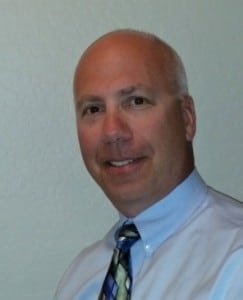
Jeff Dill, Founder of Firefighter Behavioral Health Alliance – NPO (FBHA)
FBHA was established in 2011 to educate firefighters and fire officers on suicide awareness and prevention. He travels the country discussing the data collected on the number of firefighters and EMS personnel who tragically have taken their lives. Through FBHA workshops, attendees are educated through role-play, discussion, and communication skills on how to recognize signs and symptoms of those in distress.
Jeff holds a Master’s Degree in counseling, and recently retired as a Captain from Palatine Rural Fire Protection District in Inverness, Illinois. He is a member of the American Counseling Association, National Board of Certified Counselors, International Association of Fire Chiefs, and a member of the International Association of Fire Fighters.
Jeff also sits on numerous committees including the Florian Program, IAFF, National Volunteer Fire Council, NFPA, as well as a consultant for the Western Massachusetts Fire Chiefs Coalition.
Sources for this article:
https://www.everyonegoeshome.com/2015/09/09/new-suicide-study/
https://grievingbehindthebadgeblog.net/2015/08/23/addiction-suicide-firefighter-sweeney/
https://www.nfpa.org/newsandpublications/nfpa-journal/2014/may-june-2014/features/special-report-firefighter-behavioral-health
https://www.everyonegoeshome.com/16-initiatives/13-psychological-support/
https://www.firerecruit.com/articles/1260782-Quantifying-firefighter-suicides
https://www.firerescue1.com/health/videos/584520–Mental-health-and-firefighting/
https://www.careercast.com/jobs-rated/most-stressful-jobs-2015
https://video.search.yahoo.com/search/video?p=Lisa+Ling+Videos-+Firefighter&fr=yfp-t-901-s#id=39&vid=6cff4bcc54de59233b0cc03a05d12cd6&action=view
by California Casualty | Firefighters |
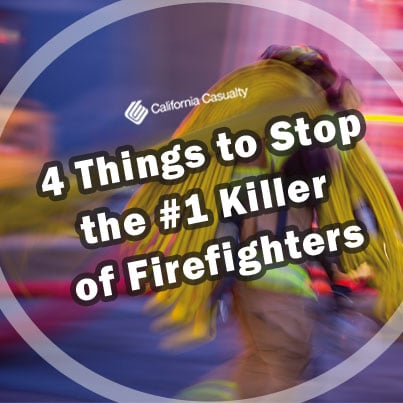
In 2013, on duty deaths caused by sudden cardiac events accounted for 35% off on-duty deaths. That’s not including others who sustained damage to their hearts and cardiovascular systems but died off duty.
It should come as no surprise that the overall killer of American men is also the number one cause of death for firefighters—both on duty and off. What should come as a surprise is that in many ways, heart disease is preventable or at least manageable. The U.S. Fire Administration (USFA)’s 2013 annual report listed 37 firefighter deaths (out of 100) due to stress or exhaustion, a broader category including not just heart attacks but also strokes, or other similar medical events. Of those 37 on-duty deaths, 36 were heart attacks.
In fact, for the average American, heart disease is the number one killer. One in every four deaths in America is the result of heart disease. It’s no surprise then that an occupation that puts such strain on the body would see an increased risk as well (more than 1 in 3). It important to note the difference between career firefighter deaths caused by cardiac arrest and those of volunteers is staggering. In some years, more than 50 percent of all volunteer firefighter deaths were caused by cardiac events according to the NFPA.

A fatality of this sort doesn’t mean that the firefighter was in poor shape; the nature of the job contributes to the risk factors. But what can be said with certainty is that maintaining proper fitness can greatly affect the risk of heart disease, making it essential for such an at-risk group.
Heart health is about habits. And there are several things that you can do today to improve your own health, as well as the health of all the firefighters in your department.
- Get your checkup…and stay up-to-date
The first step is to keep a close eye on your health—making sure that you are regularly getting checkups with your doctor and that you are following medical advice and getting the care you need. The basic checkup exam can provide clues to your doctor regarding the health of your heart.
You heart can be damaged by high blood pressure and high cholesterol. It’s critical that you get both levels checked by a doctor on a regular basis. For your blood pressure, you should get checked at least every two years, according to the Mayo Clinic. If there are any risk factors present or your blood pressure rises, you’ll want to increase the frequency with which you get checked. You need to get your cholesterol checked less often, at least once every five years, unless there are additional risk factors.
- Make exercise a priority
Exercise is an absolutely crucial aspect of heart health. Exercise strengthens your heart, lowers your blood pressure, and can help decrease stress and boost your mood. Effective exercises include walking, running, biking or swimming. Anything that ups your heart rate and keeps it elevated for a period of 30 minutes will work.
Look at the American Heart Association’s Physical Activity Guidelines and think about how you can adopt them to stay healthier. In short, they recommend at least 150 minutes of moderate-intensity aerobic activity per week, or 30 minutes, five days a week.
Implementing change is always the hardest part. NVFC suggests that all departments adopt NFPA 1500: The Standard on Fire Department Occupational Health and Safety Program. They have created a step-by-step guide for implementation to help departments get started.
- Watch what you eat
Also look at how—and what—you’re eating. Switch to whole-grain where you can, and eat more omega-3 fatty acids, which can be found in foods like fish and walnuts. More generally, try to eat foods that are closest to their natural form. As a rule, these will be better for not just your heart, but you’re whole body.
Also consider how you can improve the diet of your fellow firefighters at the station. You can find options, such as oatmeal or black beans, which are both heart healthy and soft on the budget for on duty meals. But you can also leverage other members of your community. You may even be able to get a dietician, a nutrition student from a local community college, or even a local chef to donate some time at the station to help guide the on-duty diet.
- Take advantage of firefighter-specific heart health programs
Experts recommend that fire departments provide wellness and fitness programs that emphasize continued health of firefighters. These programs should include annual evaluations of physical performance.
You should familiarize yourself with the resources available to you. For example, the National Volunteer Fire Council’s Heart-Healthy Firefighter Program offers a number of resources for departments including information on how to implement a health and wellness program for your department, as well as offering workshops and training on building motivation for health in wellness in a department.
The International Association of Fire Chiefs (IAFC) also has a Wellness/Fitness Task Force, which offers three major programs of interest: the fitness initiative, seeking to build positive, individualized fitness programs, the candidate physical ability test in order to evaluate and assist in the selection of firefighters, and a firefighter peer fitness trainer certification.
There’s a lot of data that suggests you can better manage heart related illness and death. With such a large percentage of on-duty deaths due to cardiac arrest, it makes sense to mitigate those risks where possible. More importantly, that effort put into prevention can save lives and improve the quality of life for firefighters.
by California Casualty | Firefighters, News |
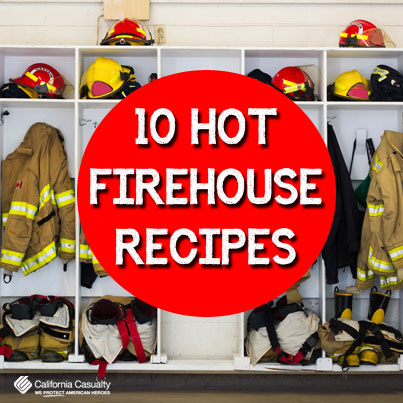
We’ve often wondered how they do it. We are talking about cooking for the crew at a fire station. Think about it; it’s hard enough preparing food for a family, but it’s even harder for a couple dozen men and women who might have to bolt at a moment’s notice. Any firehouse cook knows preparation and cooking time has to be easy, the meal nutritious, and it must be as good later that day or night as it was fresh out of the oven. We are not talking about the typical “5 Alarm Chili,” but quick, healthy meals that will nourish men and women in a physically and mentally demanding job.
While there are myriad recipe sites, we culled (we wish we could have tasted) through a half dozen to come up with these top 10 Firehouse Recipes:
- Ross Signorino’s “Rossome Ribs” (winner of Live with Regis and Kelly’s Coast to Coast Firehouse Cook-off), https://www.bhg.com/recipe/pork/rossome-ribs-firehouse-cook-off-winner/
- Runner up Tara Daniels’ “Smokin’ Pear Salad,” https://safesidesecurity.blogspot.com/2010/09/woodland-firefighter-tara-daniels.html
- Fettuccine with Ham and Chicken (submitted to thefirestations.com recipe page by Lake Jackson Volunteer Fire Department Chief Eileen Williams), https://thefirestations.com/recipe.htm
- Chief 53 Salad, also submitted to thefirestations.com recipe page by Snohomish County Fire Dist. #26’s Linda Larson, https://thefirestations.com/recipe.htm
- Mexican Lasagna from FireRecruit.com’s recipe page, https://www.firerecruit.com/kitchen/courses/810803-Mexican-Lasagna
- Firehouse Special Recipe submitted to TasteofHome.com recipe section by Darrell Alvord, https://www.tasteofhome.com/recipes/the-firehouse-special
- Firehouse Sweet Potato Hash on Yummly, https://www.yummly.com/recipe/Firehouse-Sweet-Potato-Hash-1040158?columns=6&position=1%2F8
- Italian Wedding Soup-Firehouse Style, also on Yummly, https://www.yummly.com/recipe/Italian-Wedding-Soup-Firehouse-Style-Recipezaar?columns=6&position=6%2F8
- Dan’s Smoky Vegetarian Chili submitted to Firehouse-cooking.com by Lt. Dan Chieffo of the Waterbury, CT Fire Department, https://www.firehouse-cooking.com/firehousecookingsitepages/recipearchive.html
- West Coast Jambalaya, submitted to FireRecruit.com by Capt. Mike Martinez, https://www.firerecruit.com/kitchen/courses/586887-West-Coast-Jambalaya
California Casualty understands that fire personnel work hard to protect their communities. That’s why we created the Work Hard/Play Hard contest, where one lucky first responder will win a custom Harley-Davidson FLHP Road King or $25,000. Don’t miss your chance; the entry deadline is October 7, 2015 with a winner announced later that month. The complete rules and entry form can be found at www.gocalcas.com/harley.
Auto and home insurance isn’t something that should wreck your appetite – contact a California Casualty advisor today to learn about quality insurance designed for firefighters with exclusive benefits not available to the general public. Call today for a policy review or comparison at 1.800.800.9410 or visit www.calcas.com/FireFighters.
by California Casualty | Firefighters |
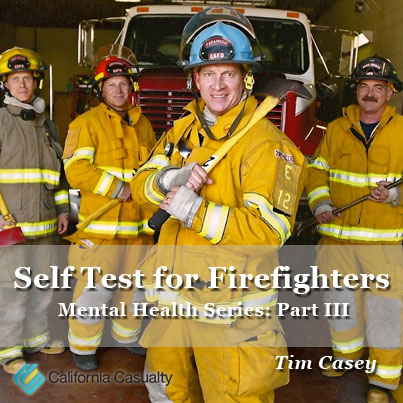 Tim Casey describes himself as, “a retired firefighter/paramedic, author, lecturer, public speaker and an alcoholic. As a public servant for more than 30 years, I know the hero business from the inside out, and I also know the costs of that profession; the human cost. My passion is trying to help save the lives of lifesavers. Firefighters are dying in record numbers, not on the job but by their own hands. Clinicians and therapists, although well intentioned, do not know how to help emergency workers and I want to help them understand us, and maybe save some lives along the way.
Tim Casey describes himself as, “a retired firefighter/paramedic, author, lecturer, public speaker and an alcoholic. As a public servant for more than 30 years, I know the hero business from the inside out, and I also know the costs of that profession; the human cost. My passion is trying to help save the lives of lifesavers. Firefighters are dying in record numbers, not on the job but by their own hands. Clinicians and therapists, although well intentioned, do not know how to help emergency workers and I want to help them understand us, and maybe save some lives along the way.
Chief Jeff Dill of the Palatine Rural Fire Protection District in suburban Chicago is a friend of mine and endless source of hope and dedication. I have lectured with him at firefighter conventions.
Because Dill is a nationally recognized authority on behavioral health issues within the fire service. He established Counseling Services for Fire Fighters, LLC based on the tragic events that surrounded Hurricane Katrina. When speaking with firefighters who returned after serving the community of New Orleans, Jeff heard the pleas of firefighters who had a difficult time talking with counselors who did not have any firefighting experience. They became frustrated and never did seek the help they needed. The Firefighter Behavioral Health Alliance (FBHA) 501(c) (3) organization was established to directly educate firefighters/ Emergency Medical Services (EMS) personnel and their families about behavioral health issues such as depression, Post Traumatic Stress Disorder (PTSD), anxiety and addictions, as well as firefighter suicides.
FBHA’s sole goal is to promote good mental health to the men and women of the fire service/EMS and their families; making a significant difference in reducing the numbers of firefighters who are turning to suicide to ease their pain. FBHA Founder Jeff Dill holds a Master’s Degree in Counseling and is a Licensed Professional Counselor in the state of Illinois.
What an amazing and passionate man. Chief Dill has spent countless hours helping fire departments all over America in dealing with firefighter suicide and comforting the families of those left behind.
Here are two dirty secrets of our storied institution, the fire service. When one of us suicides, the event is treated like an off the job incident; in my opinion it rarely is, it is a line of duty death to me, but that isn’t how we treat it.
Second, the families of these brothers and sisters, yeah women firefighters kill themselves too, are treated differently than a firefighter that dies an “honorable” death. They may get short-term support from their department, but they and the memory of their father, husband, wife, sister, or brother are quickly forgotten.
We don’t like to talk about this fact of our way of life; it’s scary to think about, so we step away quickly so we don’t have to think about it.
Chief Dill invited me to speak about my experience as a suicide survivor and firefighter. After I had shared my story with an, unfortunately, tiny audience, a Chief asked me if there was anything any of my co-workers could have done back then.
My answer was a solid yes! My crew knew I was suffering; they knew I was “off” my game; I displayed all the characteristics of someone on the brink. However, here is the thing; I know if one of them had pressed me, asked how I was doing I would have cracked.
Now I’m not putting any blame on anyone other than myself. It isn’t his or her fault I tried to kill myself. What I am saying is if we are the brave souls we fancy ourselves to be, shouldn’t we be brave enough to risk asking these questions of our co-workers and ourselves? Shouldn’t one of the lives we try to be one of our own? I know I questioned patients hard when they seemed to be a risk to themselves, hell I put hundreds on medical holds.
I refused to ask the hard questions of brothers and sisters I suspected of being in danger. It would have been impolite to ask. As I waited to speak with Chief Dill, I tried to work the crowd on his behalf, trying to stir up some interest and get a good crowd to come listen to Chief Dill. Well wasn’t I surprised? There were two major reactions, one was to be polite, take my information, and then quickly toss it in the trash. The other one shocked me.
While relaxing outside I struck up a conversation with two Chiefs from California. I offered them our handout on the warning signs of an impending suicide. They both read it, then one looked at the other and in unison, they said the name of a firefighter and both laughed a bit.
I asked them, “So you both agree you have a guy with these warning signs?” Both answered yes without hesitation. Then I asked what they planned to do about that. They sat there tongue tied with their eyes blinking. “Well, we gotta get inside we’re teaching a class. Thanks for the information.” And with that they walked away.
Ask the hard questions and you may save a brother or sister, or maybe yourself.
This self-test is from Chief Dill’s website. Below is a self-screening for suicide ideations for firefighters. Please circle either Y= Yes or N=No. When you have completed the screening, please review your score at the end.
- Are you feeling like a burden to your family, friends, or Fire Company? Y N
- Do you feel the world would be a better place without you in it? Y N
- Have you started to isolate yourself from others in the firehouse? Y N
- Have you found yourself turning to alcohol or other addictive behaviors to make yourself feel better? Y N
- Have you or someone close to you notice that your sleeping patterns have changed? Y N
- Are you thinking, “What is the use” when going to the fire house or responding on calls? Y N
- Do you find yourself thinking about or performing unnecessary risks while at a fire scene or on an emergency incident? Y N
- Have you found an increased or new interest in risky activities outside the firehouse such as sky-diving, reckless motorcycle riding or purchasing guns? Y N
- Are you displaying unexplained angry emotions or been disciplined recently for anger towards other firefighters? Officers? Or the Public within the last two months? Y N
- Have you been told “you have changed” by Friends? Family? Firefighters? Y N
- Does your family have a history of suicide? Y N
- Do you have a history of feeling depressed? Y N
- Do you have feelings of hopelessness? Y N
- Do you feel like killing yourself? Y N
- Have you created plans to kill yourself? Y N
- 16. Have you recently attempted to kill yourself? Y N
Scoring: Total the amount of (Yes) circled.
Score:__________
If you circled question 15 or 16, then please seek help immediately from a trusted friend, chaplain, counselor, dial 911 or call the National Suicide Prevention Lifeline 1-800-273-TALK (8255) or 1-800-SUICIDE (1-800-784-2433
You can listen to Jeff’s last appearance on the Firefighter Netcast Show here: “Counseling For a Firefighter- By a Firefighter” In this program, Chief Dill tells us about a new resource coming to the aid of the fire service.
by California Casualty | Firefighters |
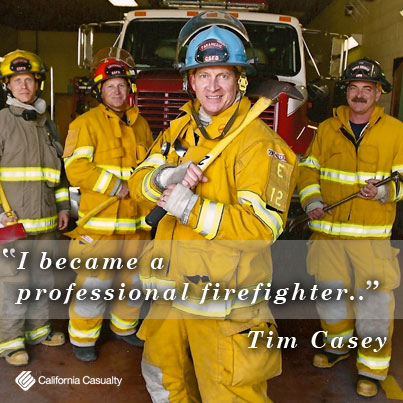
Tim Casey describes himself as, “a retired firefighter/paramedic, author, lecturer, public speaker and an alcoholic. As a public servant for more than 30 years, I know the hero business from the inside out, and I also know the costs of that profession; the human cost. My passion is trying to help save the lives of lifesavers. Firefighters are dying in record numbers, not on the job but by their own hands. Clinicians and therapists, although well intentioned, do not know how to help emergency workers and I want to help them understand us, and maybe save some lives along the way.
I became a professional firefighter/paramedic at 19 years of age and proceeded to work in that field for the next 31 years. Best job I ever had, the worst job I ever had, and it spanned four decades from 1979 until I retired in 2009. I delivered nine babies over those years, helped save hundreds of lives, and fought enough fire to keep me content into my golden years.
I became a firefighter quite by accident. Right out of high school, I went to work at the largest car dealership in my hometown. Things were going along well until the day I gave my unsolicited opinion to the general manager of the store. He admired the frankness of what I had to say but not the content of my statement.
Later that same day I called my father to tell him the news of my recent separation from work and to ask if he might be aware of any job openings. As in turned out he did know someone was hiring. The chief of a small fire department on the outskirts of town was looking for a firefighter. The next day I interviewed for the position and the day after that I was a fireman.
Looking back, I was too young, inexperienced, and naive to have made that decision; I had no idea of what was to come. I had stumbled into the coolest jobs any man could have. Overnight I went from being a zero to being a hero, an American icon, a firefighter.
I quite literally grew up in fire stations; I started as a teenager, I was married and divorced twice while I was a firefighter, I had three children, became an alcoholic, and survived a suicide attempt over those years. Throughout my entire adult life I was always part of a team and had tremendous resources available to me for all my decision-making – my fellow firefighters were more than willing to help me, especially the older guys who got a vicarious thrill out of hearing about my adventures.
The belief that we as firefighters are a brotherhood and sisterhood is deeply ingrained in our psyches from the outset of our career. No one outside our culture has any grasp on what it is to be a firefighter. People can imagine, but they can only guess how they might feel if they were confronted with the realities of our job.
However, their best guesses are based on film, TV, or literature; they are just that, a guess. If you have never walked in our boots, never walked through fire, death, and disaster, then you will never get it, you will never understand how we feel about each other.
That culture is one of the biggest problems facing the fire service, the notion that being a firefighter prevents us from being normal feeling people, from having emotions, from the damage our experiences, burden us with. It has to be abandoned, or we will suffer more and more tragedies like a result of “pulling on our big boy pants.”
We must learn to care for our own with the same vigor we extend to our customers. We must protect our people from these horrors, care for each other and our families, or we will attend more funerals and us will suffer the loss of great people because of pride, toughness, and bravado. I share my personal story of alcoholism and suicide so that when another firefighter is suffering and feeling they are alone in their struggle, they know they are not alone – that at least one other firefighter has stood in their shoes and made it out of the darkness. It’s me; I have, and I am willing to help in anyway I can.
Below are links to some valuable resources for a starting point.
4-steps-to-help-a-mentally-distressed-firefighter
Firefighter Behavioral Health Alliance
Initiative 13
by California Casualty | Firefighters, Peace Officers |
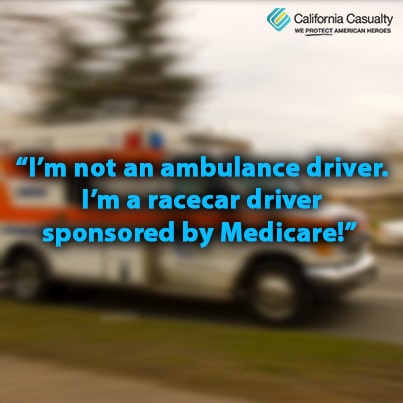
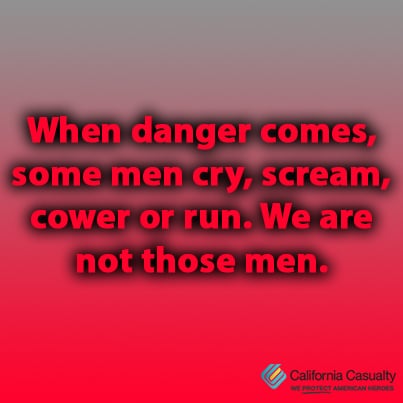
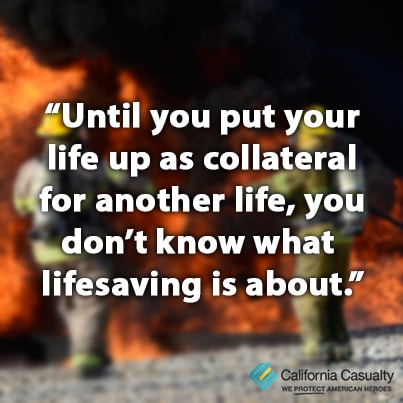
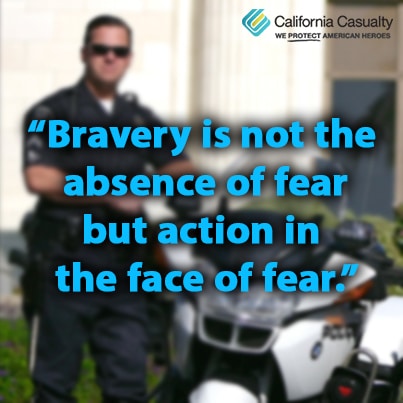
Check out these quotes for other occupations:
Educators
Nurses











